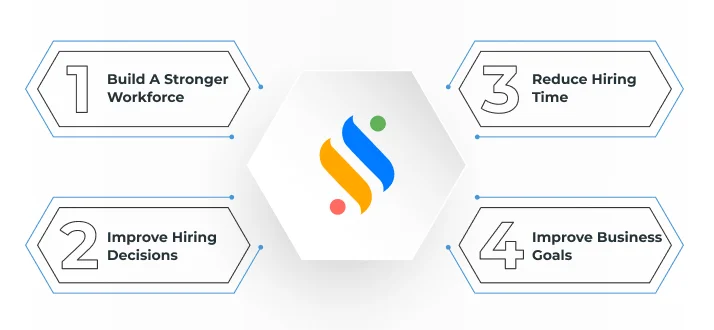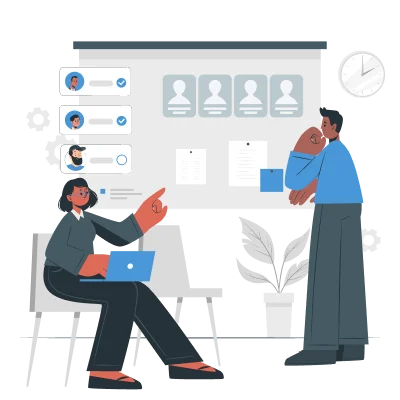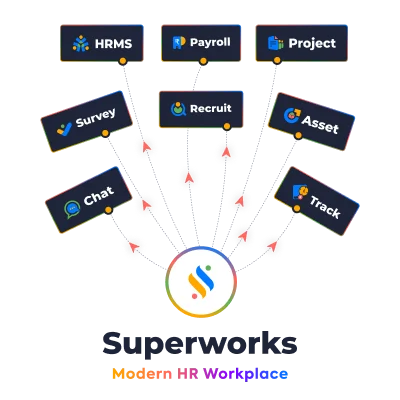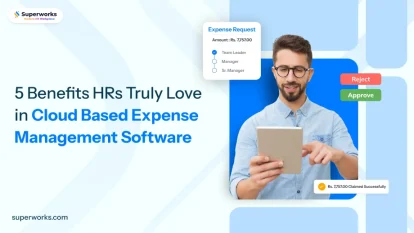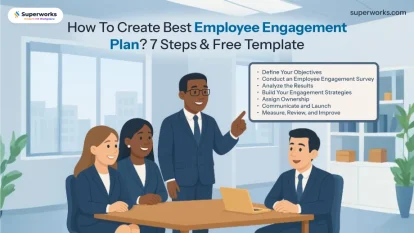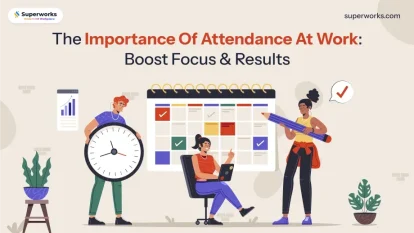A strategic recruitment plan is a comprehensive approach to getting the right talent in the office. It includes identifying, attracting, and hiring talent. This aligns with a company's long-term business goals. The plan involves setting clear goals, defining key roles, developing strategies in recruitment, and leveraging technology.
Grab a chance to avail 6 Months of Performance Module for FREE
Book a free demo session & learn more about it!
-
Will customized solution for your needs
-
Empowering users with user-friendly features
-
Driving success across diverse industries, everywhere.
Grab a chance to avail 6 Months of Performance Module for FREE
Book a free demo session & learn more about it!
Superworks
Modern HR Workplace
Your Partner in the entire Employee Life Cycle
From recruitment to retirement manage every stage of employee lifecycle with ease.


Seamless onboarding & offboarding
Automated compliance & payroll
Track performance & engagement
How To Successfully Build A Strategic Hiring Plan For Your Business
- What is your hiring strategy
- 7 min read
- September 5, 2024
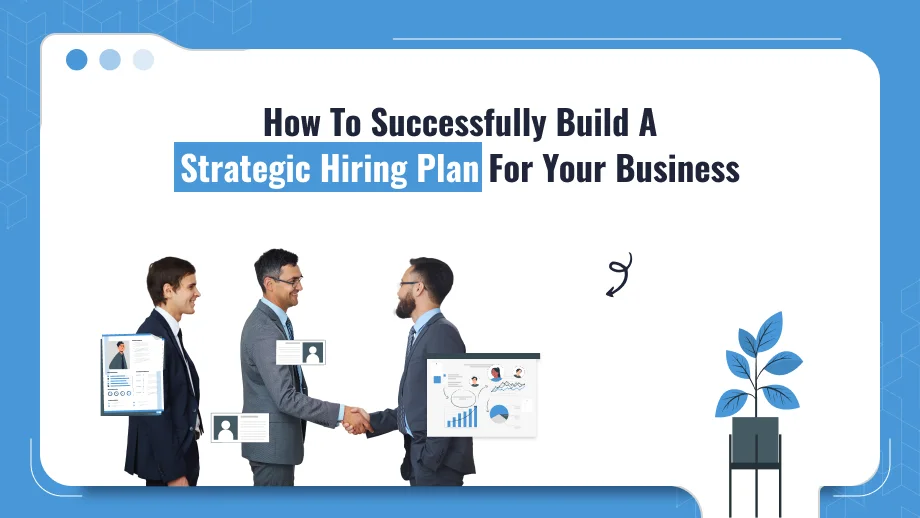
A small-scale business, a medium-sized company, or a big enterprise, the task of choosing the perfect employee for the company is a daunting task. It’s a tough call for HR or a recruiter. In this case, they have to make a proper recruiting strategy.
The recruiting strategies range from the selection of the most appropriate method for attracting talent. Proper strategic HR management will simplify the need to search, interview, and hire new employees.
As per today’s scenario, strategic hiring practices have become more significant. Effective recruitment planning besides attracting the best candidates for various positions helps your business prepare to meet up with growth in the future.
In this article, we will guide you through the necessary steps for building a strategic hiring plan that aligns with your objectives.
What Is A Hiring Plan?
If you are one who is wondering- what is hiring strategy or plan then this is the answer.
A hiring plan is a roadmap that illustrates how an organization or HR plans to approach hiring. The hiring process should include all the data that hiring managers and team members would require to ensure that the hiring process aligns with the goals of the company.
A strategic hiring plan would contain long-term strategies, apart from the strategic planning templates which could be changed if and when required.
Longer-term elements of a hiring plan could include:
- A statement on company culture to put into job descriptions
- Mailing that defines the organization
- Details on the various hiring strategies or recruiting tools such as Superworks
The process or plan explains what skills are needed, and when the resources will be required in the recruitment process. This strategic hiring plan template helps organizations forecast when talent will be required and identifies recruitment at that time.
See a 90% improvement in the strategic hiring plan now!
Take your hiring to the next level with Superworks.
Benefits Of Having A Strategic Hiring Plan
Having a strategic hiring plan offers many advantages which would be a major factor affecting your business.
The benefits of creating a hiring plan are as follows:
– Build A Stronger Workforce
A robust workforce will be better prepared to respond to any industry. Companies need to have plans put in place now for talent acquisition if they want to survive their fragile, formative years.
This helps you be more strategic in your hiring, focusing on people who can grow with your company and take advantage of learning and development opportunities.
– Improve Hiring Decisions
The hiring plan tends to be evidence-based, and skills-oriented rather than subjective experience or other unreliable factors. This talent acquisition planning helps you increase your chances of hiring someone closer to the role’s requirements.
A recruitment plan also helps you to identify opportunities to outsource work or hire the best.
– Reduce Hiring Time
Recruiters can repeatedly use certain channels, such as campus recruitments or job boards if it is known that they bring the best talent.
The planning includes encouraging the best candidates to lose interest in joining the company. On the other hand, a well-outlined recruitment strategy aids recruiters in making quicker and more effective decisions.
– Improve Business Goals
A strategic hiring plan aligns your recruitment efforts with the long-term goals of the company. It aids in the determination of key positions holding importance for the achievement.
A well-structured strategic hiring plan reduces unnecessary expenditure of time and resources on hiring.
Who Builds A Hiring Plan?
Building the plan is the responsibility of the HR department, but crucial insight into organizational needs is often required from team leads, department heads, and executives.
Human Resources: The human resource team drives the leading role in formulating and implementing the hiring strategy. They are supposed to understand the overall HR strategy examples of the company and develop it.
Recruitment Team: They are responsible for the implementation of the hiring plan. They are recruiters and need to focus on the hiring strategy example. It includes making strategies in recruitment, interviews, and candidate selection.
Departmental Heads: The head of a department provides an insight view of the particular talent needed for the department. This will help in establishing the skills and experience required for a particular position.
Executives/Leadership Team: The leadership team will provide the strategic direction and long-term goals. Being on board with the process, they will ensure that the hiring strategy aligns with the vision set out by the company.
How To Build A Hiring Plan?
Key activities leading to a strategic recruitment plan include the following:
1. Assess Your Present Workforce
Understand your current workforce by identifying any skill gaps or areas where more talent may be needed. The assessment of hiring needs to be very elaborate, starting with the current work but also expanding to possible future requirements.
Engage heads of departments and team leaders to grab valuable information. Knowing not only the strengths but also the weaknesses of your current workforce allows you to align your strategic hiring plan.
2. Establish Your Hiring Objectives
Spell out what you wish to gain from your hiring strategy. These may be goals related to diversity improvement, reduction in time-to-hire, or improvement in employee retention. Second, your hiring goals must be specific, measurable, attainable, relevant, and time-bound-smart.
Your goals shall guide you not only in developing your recruitment strategy plan but also in measuring its success over time. This will help your recruitment feed into the overall strategic aims of the business.
3. Identifying Key Roles
Identify those positions that have much relevance to the success of your business. Always give such positions priority in your hiring plan when allocating resources. Ascertain what the implications of leaving such a role vacant will be on the company’s long-term goals.
In focusing on key roles, you have your recruitment efforts aligned with the most urgent needs.
4. Create a Hiring Timeline
Establish a timeline for the recruitment effort. Take into consideration urgency with filling some roles, candidate availability, and your company’s budget. Any well-structured hire strategy timeline also has to do with milestones pertaining to every stage of the hiring process.
A strategic hiring plan is not just about finding the right people, but it is about finding them within a timeline.
5. Establish a Budget
Determine the financial resources available for recruitment. Your budget should address which department needs hiring and which type of candidate is required in the office. A well-managed budget keeps over-investment at bay so that your business can stay healthy while chasing its strategic hiring goals.
Technology That Helps To Create Hiring Plan Format
Nowadays, technology also plays a major role in formulating and implementing a strategic hiring plan. Some of the main tools that can help are explained below.
Application Tracking Systems: The ATS system with top HRMS software automates several activities in the recruitment process. It includes posting jobs, screening resumes, and communicating with applicants. You can also make a centralized database of applicants for better management of your hiring strategy plan.
HR Analytics Software: All the basic HR analytics tools would deliver data insights into time-to-hire, cost-per-hire, and candidate quality. This information would definitely help you enhance your hiring plan so as to make certain decisions.
HRMS Software: Full-service HRMS software will carry out everything right from recruitment to retirement on a single platform. Using such tools, you can design a template for a hiring plan that best suits your business needs.
Collaboration Tools: Check other platforms that allow for communication by human resources teams, department heads, and leadership. These are extremely important with regard to coordinating efforts.
Sourcing Tools: Online job boards, social media platforms, and professional networks, such as LinkedIn, are good sources of candidates. Specialized sourcing tools will enable you to identify passive candidates who are not looking for a job yet fit your requirements perfectly.
Final Thought
A strategic hiring plan would be the building block for any company desiring to attract top talent to ensure long-term success. By aligning your recruiting to the goals of the business, you will know who to hire and when.
You need to keep in mind that a successful strategy for hiring is not a one-time thing’s more of a continuous process of adjustments. Consider us to help you in any kind of case even though you don’t know – what is your hiring strategy?
FAQs
What Is A Strategic Recruitment Plan?
What Is Strategic Hiring?
Strategic hiring refers to the process of recruiting employees based on the long-term goals. The strategy involves carefully selecting candidates who not only have the required skills but also fit the company culture.
How To Create A Hiring Strategy?
To create a hiring strategy, start by assessing your current workforce and identifying skill gaps. Then you need to define your hiring goals, prioritize key roles, develop effective sourcing strategies in recruitment, and establish a budget.
What Is Employee Hiring Strategy?
An employee hiring strategy is a plan that outlines how a company will attract, select, and hire the right candidates for its open positions.
How To Design A Recruitment And Hiring Plan?
Designing a recruitment and hiring plan involves several steps: checking workforce needs, defining hiring goals, identifying key roles, developing sourcing strategies, setting a budget, and implementing technology.

